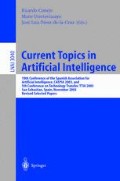Abstract
The development of software systems is a complex task that requires support techniques to guide the process and solve inconsistencies in its products. In the agent paradigm, the use of social and intentional abstractions facilitates the application of these techniques in theories for the analysis of human societies, such as the Activity Theory. The Activity Theory proposes patterns that appear in human groups to explain their behaviour, and the study of their internal contradictions to understand its evolution. These patterns can be translated to the agent paradigm to reason about the behaviour of multi-agent systems. To ease the use of such techniques, a partially automatized process is proposed. The aim is to create an assistant that helps developers in the specification of their multi-agent systems. The use of this tool is evaluated through case studies specified with the INGENIAS notation.
This work has been developed in the project INGENIAS (TIC2002-04516-C03-03), which is funded by Spanish Ministry of Science and Technology.
Access this chapter
Tax calculation will be finalised at checkout
Purchases are for personal use only
Preview
Unable to display preview. Download preview PDF.
References
Cost, R.S., Chen, Y., Finin, T., Labrou, Y., Peng, Y.: Using Colored Petri Nets for Conversation Modeling. Issues in Agent Communication. Springer Verlag (2000)
Engeström, Y.: Learning by expanding. Orientakonsultit, Helsinki (1987)
Ferber, J.: Multi-Agent Systems. Addison-Wesley, Reading (1999)
Gamma, E., Helm, R., Johnson, R., Vlissides, J.: Design Patterns: Elements of Reusable Object-Oriented Software. Addison Wesley Professional Computing Series (1995)
Gómez-Sanz, J., Pavón, J.: Agent Oriented Software Engineering with INGENIAS. In: Mařík, V., Müller, J.P., Pěchouček, M. (eds.) CEEMAS 2003. LNCS (LNAI), vol. 2691, p. 394. Springer, Heidelberg (2003)
Jacobson, I., Rumbaugh, J., Booch, G.: The Unified Software Development Process. Addison-Wesley, Reading (1999)
Jennings, N.R., Wooldridge, M.: Agent-Oriented Software Engineering. In: Bradshaw, J. (ed.) Handbook of Agent Technology, AAAI/MIT Press (2000)
Kuutti, K.: Activity Theory as a potential framework for Human-computer interaction research. In: Nardi, B.A. (ed.) Context and Consciousness: Activity Theory and Human-Computer Interaction, MIT press, Cambridge (1996)
Leontiev, A.N.: Activity, Consciousness, and Personality. Prentice-Hall, Englewood Cliffs (1978)
Maes, P.: Modeling Adaptative Autonomous Agents. In: Langton, C. (ed.) Artificial Life Journal, vol. 1(1 & 2), MIT Press, Cambridge (1994)
Maes, P.: Agents that Reduces Work and Information Overload. Readings in Intelligent User Interfaces. Morgan Kauffman Publishers, San Francisco (1998)
Newell, A.: The knowledge level. Artificial Intelligence 18, 87–127 (1982)
OMG: Unified Modeling Language Specification. Version 1.3, http://www.omg.org
Pressman, R.S.: Software Engineering: A Practitioner’s Approach. McGraw-Hill Series in Software Engineering and Technology. McGraw-Hill, Inc., New York (1982)
Rao, A.S., Georgeff, M.P.: Modeling Rational Agents within a BDI-Architecture. In: Proceedings of the 2nd International Conference on Principles of Knowledge Representation and Reasoning (KR 1991) (1991)
Sommerville, I.: Software Engineering, 6th edn. Addison-Wesley International Computer Science Series. Addison-Wesley, Reading (2001)
Sykara, K.P.: Multiagent systems. AI Magazine 19(2) (1998)
Vygotsky, L.S.: Mind and Society. Harvard University, Cambridge (1978)
Yu, E.S.K.: Towards Modelling and Reasoning Support for Early-Phase Requirements Engineering. In: Proceedings of the 3rd IEEE Int. Symp. on Requirements Engineering (RE 1997), Washington D.C., USA, January 6-8, pp. 226–235 (1997)
Author information
Authors and Affiliations
Editor information
Editors and Affiliations
Rights and permissions
Copyright information
© 2004 Springer-Verlag Berlin Heidelberg
About this paper
Cite this paper
Fuentes, R., Gómez-Sanz, J.J., Pavón, J. (2004). Social Analysis of Multi-agent Systems with Activity Theory. In: Conejo, R., Urretavizcaya, M., Pérez-de-la-Cruz, JL. (eds) Current Topics in Artificial Intelligence. TTIA 2003. Lecture Notes in Computer Science(), vol 3040. Springer, Berlin, Heidelberg. https://doi.org/10.1007/978-3-540-25945-9_52
Download citation
DOI: https://doi.org/10.1007/978-3-540-25945-9_52
Publisher Name: Springer, Berlin, Heidelberg
Print ISBN: 978-3-540-22218-7
Online ISBN: 978-3-540-25945-9
eBook Packages: Springer Book Archive

